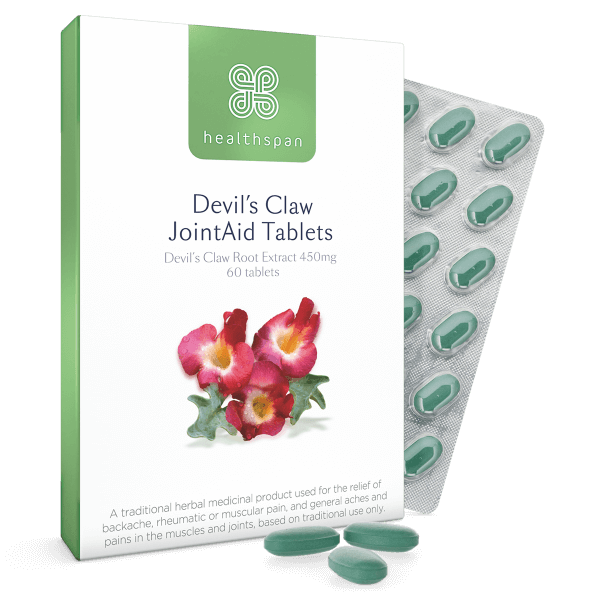Aches and pains can bring you to a standstill, but Devil's Claw helps to keep you on the move, says herbalist Simon Mills.
🕒 2 min read
Native to the Kalahari desert in South Africa, Devil's Claw, Harpagophytum procumbens, is a perennial shrub that takes its common name from its fruit, which are covered with ferociously curved spines. Its botanical name is derived from the Greek 'harpago' meaning a grappling hook.
Where does it come from?
Devil's Claw has a long history of traditional medicinal use in African medicine. It was used for a variety of conditions including joint and muscle pains, digestive problems, headaches, fever management, and externally for skin inflammation.
It was not until the early 1900s when a German pioneer, Dr Mehnert, observed a dramatically successful traditional treatment with the root tuber of this African herb that it started to get talked about in Europe. These same tubers are now used in supplements to treat many types of aches and pains.
How does it work?
It is not known exactly how Devil's Claw works but its tubers have a number of active chemical compounds that have been studied extensively by scientists. One of the most important are 'harpagosides', which research shows have anti-inflammatory and analgesic properties, making Devil's Claw a useful remedy for a wide variety of joint conditions.
What can it help?
Back pain
A study published in the journal Phytotherapy showed that doses equivalent to four 600mg tablets of Devil's Claw extract per day were most effective, significantly reducing the number of people with long-term back pain over four weeks, compared to those taking a placebo. This benefit was not seen in cases where the back pain radiated down the legs.
Arthritis
In a clinical trial involving people with moderate rather than severe chronic arthritis, those taking Devil's Claw showed a greater improvement in joint pain and spinal mobility than those on a placebo. The benefits were seen with doses equivalent to two 600mg tablets per day over eight weeks.
How should I take it?
Devil's Claw should be taken for four to eight weeks for the full effects to be seen. Recent studies show that its benefits are decreased by stomach acidity. It is therefore more effective when taken as a concentrated extract in tablet form rather than in teas or liquid preparations. For the same reason it should be taken between meals when stomach activity is at its lowest.
Are there any side effects?
As Devil's Claw does not have the same action as conventional arthritis medicines like ibuprofen it will not cause the associated upset stomach. In fact, there have been remarkably few side effects reported, even under rigorous clinical research conditions.
Devil's Claw, however, stimulates bile production so it is not suitable for people with gallstones or stomach acidity.

Devil's Claw JointAid
Traditionally used for backache and muscular pain
- Registered Traditional Herbal Medicine (THR)
- 450mg root extract
- Traditionally used for relief of backache and rheumatic or muscular pain
Good for
Lower back pain, painful joints caused by arthritis, general muscular aches and pains.
Watchpoint
In rare cases, Devil's Claw can make you feel sleepy or dizzy. If affected, don't drive or operate machinery.
What to buy
Devil's Claw tablets differ in strength and quality, so make sure you buy a Registered Traditional Herbal Medicine (THR).







